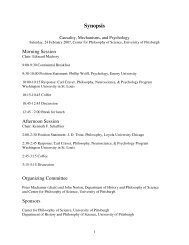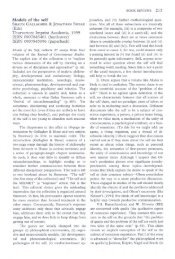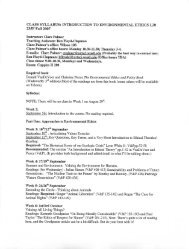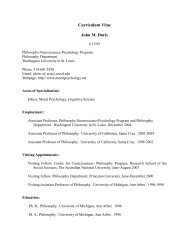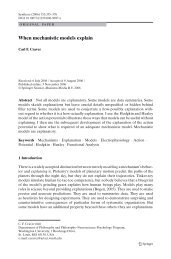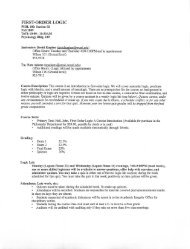The Blackwell Guide to the Philosophy of Science - The Department ...
The Blackwell Guide to the Philosophy of Science - The Department ...
The Blackwell Guide to the Philosophy of Science - The Department ...
Create successful ePaper yourself
Turn your PDF publications into a flip-book with our unique Google optimized e-Paper software.
Experiment and Observation<br />
legitimately be interpreted as indicating. <strong>The</strong> Skeptical Chymist is filled with examples<br />
<strong>of</strong> what can be involved in deciding whe<strong>the</strong>r a proposed interpretation is<br />
legitimate. <strong>The</strong>mistius’ illustration assumes that burning decomposes wood in<strong>to</strong><br />
its component elements. Carneades objects that for all <strong>the</strong>y know, heating produces<br />
new stuffs, or that <strong>the</strong> ash and o<strong>the</strong>r residues came from <strong>the</strong> air, <strong>the</strong> container<br />
in which <strong>the</strong> sample was heated, or impurities in <strong>the</strong> sample (Boyle, 1661,<br />
p. 27ff ). As we’ll see, a number <strong>of</strong> twentieth century controversies in <strong>the</strong> philosophy<br />
<strong>of</strong> science amount <strong>to</strong> versions <strong>of</strong> <strong>the</strong> question whe<strong>the</strong>r reasoning from experimental<br />
or observational outcomes can reveal more about what goes on in nature<br />
than <strong>The</strong>mistius’ question begging illustrations.<br />
Neglecting Experiment; Dis<strong>to</strong>rting Observation<br />
<strong>The</strong> logical positivists 5 are <strong>the</strong> giants whose shoulders we stand on. <strong>The</strong>y made<br />
invaluable contributions <strong>to</strong> philosophy <strong>of</strong> science, and are largely responsible for<br />
its establishment as an academic discipline. <strong>The</strong>ir work was important <strong>to</strong> <strong>the</strong> linguistic<br />
turn which founded analytic philosophy, but <strong>the</strong>y are largely responsible<br />
for a neglect <strong>of</strong> experiment and observation which blinded twentieth century<br />
philosophers <strong>of</strong> science <strong>to</strong> facts about <strong>the</strong> production and interpretation <strong>of</strong> empirical<br />
data which bear importantly on <strong>the</strong>ir epistemological and metaphysical concerns.<br />
<strong>The</strong> logical positivists taught <strong>the</strong>ir followers <strong>to</strong> treat scientific <strong>the</strong>ories as if<br />
<strong>the</strong>y were deductively closed collections <strong>of</strong> propositions, including observation<br />
reports expressed in a vocabulary which includes terms which signify observables,<br />
<strong>the</strong>oretical propositions expressed in a vocabulary whose terms do not signify<br />
observables, and correspondence rules <strong>of</strong> mixed vocabulary which can be used <strong>to</strong><br />
derive predictions and explanations <strong>of</strong> observables from <strong>the</strong>oretical propositions,<br />
and <strong>to</strong> test <strong>the</strong>oretical propositions against observation reports (Nagel, 1961, pp.<br />
90–117). This conception models scientific prediction, explanation, and <strong>the</strong>ory<br />
testing in terms <strong>of</strong> inferential relations among sentence-like structures. But so conceived,<br />
what does science have <strong>to</strong> do with <strong>the</strong> natural world <strong>of</strong> non-sentential,<br />
extra-linguistic things, features, events, processes, etc., scientists investigate?<br />
Hempel (1935, pp. 50–1) responded <strong>to</strong> related questions by claiming that no<br />
<strong>the</strong>orist who<br />
supports a cleavage between statements and reality is able <strong>to</strong> give a precise account<br />
<strong>of</strong> how a comparison between statements and facts may possibly be accomplished.<br />
In keeping with this, and with <strong>the</strong>ir appreciation <strong>of</strong> <strong>the</strong> power <strong>of</strong> newly developed<br />
logical <strong>to</strong>ols for <strong>the</strong> study <strong>of</strong> <strong>the</strong> systems <strong>of</strong> sentences <strong>the</strong>y used <strong>to</strong> model<br />
scientific <strong>the</strong>ories, analytic philosophers <strong>of</strong> science downplayed <strong>the</strong> cleavage<br />
and devoted <strong>the</strong>mselves <strong>to</strong> investigating <strong>the</strong> syntax and semantics <strong>of</strong> observation<br />
and <strong>the</strong>oretical languages. In sharp contrast <strong>to</strong> nineteenth century figures – like<br />
131



